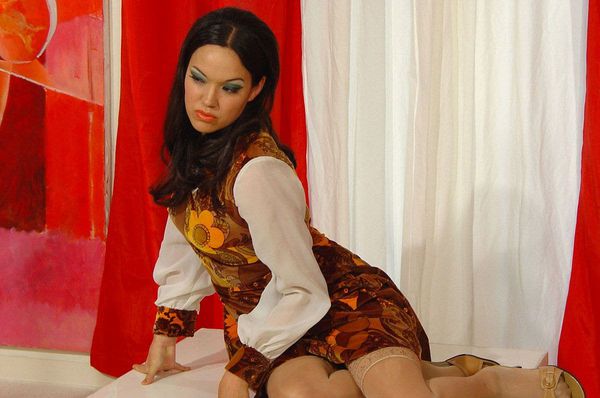A pointed send-up of 1970s sexploitation films, but with the script so clunky and the acting so stilted it becomes uncanny. Biller uses the same effect for The Love Witch, and after seeing this earlier film I wonder whether she can direct in any other mode. The film is purposefully bad, so what would a good Anna Biller film look like? Or is she incapable of moving beyond pastiche?
Because actually not all of Viva is purposefully bad. Biller works so slowly because she approaches her films as an artist might – designing the sets, artwork and costumes, as well as writing, acting, editing and directing. The texture of the film is therefore spectacular, and the clothes are amazing. There is also a very well-executed climactic (and unsettling) sex scene which uses psychedelic animation and outrageous focus pulls to great effect. At its best Viva is like no other film.
Biller sets her sights on unpeeling the complexities of the sexual revolution, with a plot lifted from Buñuel's Belle De Jour but with the consequences of female sexual liberation a tad more equivocal. At one point one of the male characters looks straight at the camera and confesses that men have never and will never have it so good – able to take advantage of the permissive society without taking responsibility for it. During the film, Biller's character is frequently sexually harassed, and at one point violently raped, by the free spirits around her. One of her prospective paramours fulminates against "women's lib" for the fact that Biller hasn't slept with him yet. Eventually, he tires of waiting, drugs her at a party and sleeps with her – hardly enlightened behaviour.
The only partners that treat Biller decently are her husband and a female lover. She eventually tires of the predators around her, but when she decides to go back to her marriage she doesn't refer back to the awful sexual violence she experienced. Instead, she says she became frightened of her own desires, and how she'd taken them too far. It's a strange inversion of where the guilt should actually lie. But maybe the film is being ambiguous on this point, and we should take her explanation at face value. Perhaps these sexual experiences were part of the fabric of her fantasies.
Biller's project, after all, is to reinsert the female gaze back into the history of cinema. The violent rape is transparently horrific, but her portrayal of the second rape at the party is the film at it's most erotic, which is a disturbing tone to strike. The starting point for the character, however, is a marriage where the husband isn't around – that's why she strays. The film ends with the tables turned – Biller's character feels truly free once the husband's liberty is curtailed. But even then that freedom is equivocal, found in the theatre production of the man who raped her. Throughout the film, female desire is circumscribed or channelled by men who don't have women's best interests at heart. It's a fantasy barred on all sides by a culture that remains overwhelmingly sexist.


No comments:
Post a Comment